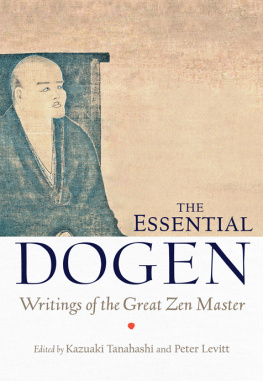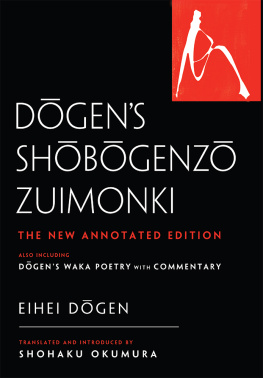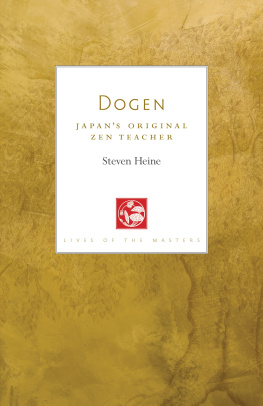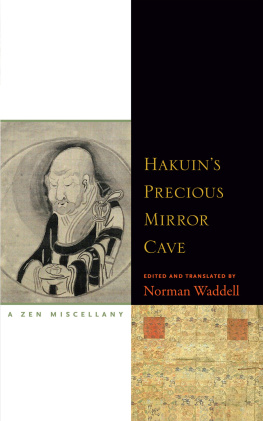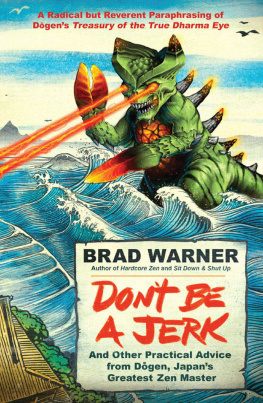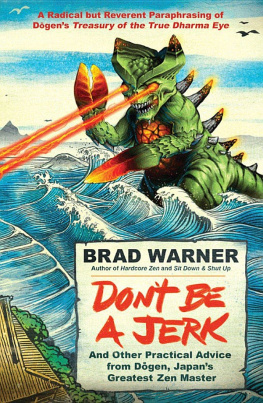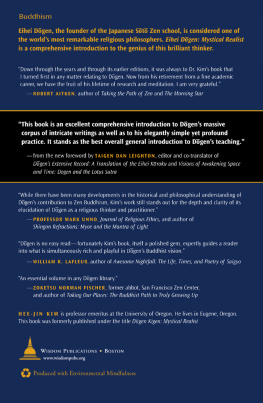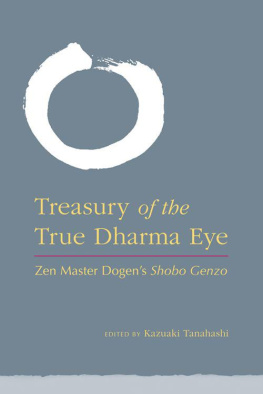ABOUT THE BOOK
Eihei Dogen (12001253), founder of the Soto School of Zen Buddhism, is one of the greatest religious, philosophical, and literary geniuses of Japan. His writings have been studied by Zen students for centuries, particularly his masterwork, Shobo Genzo or Treasury of the True Dharma Eye. This is the first book to offer the great masters incisive wisdom in short selections taken from the whole range of his voluminous works. The pithy and powerful readings, arranged according to theme, provide a perfect introduction to Dogenand inspire spiritual practice in people of all traditions.
KAZUAKI TANAHASHI, a Japanese-trained calligrapher, is the pioneer of the genre of one stroke painting as well as the creator of multicolor enso (Zen circles). His brushwork has been shown in solo exhibitions in galleries, museums, and universities all over the world. Tanahashi has edited several books of Dogens writings and is also the author of Brush Mind.
Sign up to learn more about our books and receive special offers from Shambhala Publications.

Or visit us online to sign up at shambhala.com/eshambhala.
THE ESSENTIAL DOGEN
Writings of the Great Zen Master
Edited by
Kazuaki Tanahashi and Peter Levitt

SHAMBHALA
Boston & London
2013
Shambhala Publications, Inc.
Horticultural Hall
300 Massachusetts Avenue
Boston, Massachusetts 02115
www.shambhala.com
2013 by the San Francisco Zen Center
Cover art: Portrait of Dogen from Hokyo-ji temple, Fukui Prefecture
Quotations from Moon in a Dewdrop, edited by Kazuaki Tanahashi, published by North Point Pressten poems plus four passages as indicated in the sources and translation creditsreprinted with permission by Farrar, Straus, & Giroux.
Excerpt of fifteen lines from SONG from COLLECTED POEMS 19471980 by Allen Ginsberg. Copyright 1954 by Allen Ginsberg. Reprinted by permission of HarperCollins Publishers.
Excerpt of fifteen lines from Song by Allen Ginsberg, taken from COLLECTED POEMS 19471980. Copyright 1954, Allen Ginsberg, used by permission of The Wylie Agency (UK) Limited.
All rights reserved. No part of this book may be reproduced in any form or by any means, electronic or mechanical, including photocopying, recording, or by any information storage and retrieval system, without permission in writing from the publisher.
LIBRARY OF CONGRESS CATALOGING-IN-PUBLICATION DATA
Dogen, 12001253.
[Works. Selections. English]
The essential Dogen: writings of the great zen master / edited by Kazuaki Tanahashi and Peter Levitt.First edition.
pages cm
Includes bibliographical references.
eISBN 978-0-8348-2847-6
ISBN 978-1-61180-041-8 (pbk.: alk. paper) 1. Zen Buddhism. I. Tanahashi, Kazuaki, 1933 II. Levitt, Peter. III. Title.
BQ9449.D653E55 2013
294.3927DC23
2012037078
For Shirley and Linda
love and deep gratitude
Contents
Eihei Dogen (12001253) is one of the greatest elucidators of meditation in the ancient world. His writings today inspire many of those who contemplate in different spiritual traditions and are interested in expanding and deepening their meditative experience.
Dogen was an extraordinary thinker, visionary, poet, writer, scholar, teacher, introducer of Zen, leader of a spiritual community, and reformer of Buddhism in Japan. He is emerging as one of the most widely read and studied Buddhists in the Western world; more than sixty books in English with his name on their covers are available now. Yet his writings are often technical, paradoxical, enigmatic, and repetitive.
This volume is intended to make his writings easily accessible to readers, including those who are not familiar with Zen or Buddhism in general. Peter Levitt and I have selected passages from Dogens enormous body of work throughout his career and classified them according to theme. We hope that this approach will help those who are interested in his thinking and teachings on various topics. We have also included a selection of Dogens poems that, at a glance, might appear eccentric or absurd but may be more easily understood when placed in the context of his other writings.
Dogen was ordained as a monk at age fourteen (in the East Asian way of counting; see ), started studying Zen at age eighteen, and went to China to complete his study between the ages of twenty-four and twenty-eight. He established his first training center, Kosho Monastery, when he was thirty-four and started building a full-scale monastery in a remote province of Echizen at age forty-four, which was established in the following year. He died at age fifty-four.
Treasury of the True Dharma Eye (Shobo Genzo) is Dogens lifework. It is one of the first Buddhist teachings written in Japanese, in a mixture of ideographs and phonetics. Until then, Buddhists in his country had written their teachings in Chinese, which were then read in a Japanized Chinese manner. Dogen kept to the tradition of using Chinese when he quoted scriptures and earlier Zen stories. Most of our excerpts are from the book of the same title published recently by Shambhala Publications.
Dogen wrote two types of poemswaka and Chinese-style poems. Waka is an old style of Japanese poetry consisting of thirty-one syllables: five, seven, five, seven, and seven. Poems translated here in five lines are waka. The Chinese-style poems are found in another massive collection of Dogens formal talks, monastic guidelines, and other types of talks and writings compiled by his senior students. Dogens Extensive Record: Translation of the Eihei Koroku by Taigen Dan Leighton and Shohaku Okumura is an excellent presentation of this collection of Dogens writings. We cross-reference the Chinese-style poems included in our book to the Leighton-Okumura book for comparison and to give the reader a sense of where these poems were placed in the original collection.
The Essential Dogen is the fifth of the San Francisco Zen Centers Dogen book projectsfollowing Moon in a Dewdrop, Enlightenment Unfolds, Beyond Thinking, and Treasury of the True Dharma Eye. I deeply appreciate my thirty-six years of collaboration and friendship with all the staff and abbots of the Zen Center. My special gratitude goes to Michael Wenger, in charge of publication, for his continuous support and good ideas. I would like to thank all of my cotranslators of Dogen texts whose names are shown in the section Sources and Translation Credits for their great contribution.
Dogen is fortunate to have Peter Levitt, an accomplished Zen teacher, and outstanding poet, to help refine his expressions in the English language. Peter and I have been friends since 1987 and have worked together on a number of writing projects, including the last Dogen book, Treasury of the True Dharma Eye: Zen Master Dogens Shobo Genzo. My annual visits to him in British Columbia, Canada, as well as his visits to Linda and me in Berkeley, California, are always full of tremendous pleasure. I thank Shirley Graham, his wife, a wonderful poet, for her kindness and support. My gratitude goes to Taigen Dan Leighton for his assistance on our selected bibliography. I also thank Lisa Senauke and Asaki Watanabe for their assistance on the Sources and Translation Credits section.
As always, it has been a great pleasure working with the Shambhala Publications staff. Peter and I thank Jonathan Green, Hazel Bercholz, and Ben Gleason. We appreciate DeAnna Satre for her copyediting. Our special appreciation goes to Dave ONeal, our principal editor, who has guided us through the publication process.
Next page
